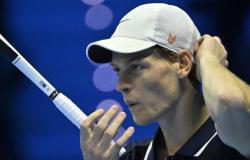Hosting World Cup events is essential for many reasons at Alpine Canada, including its commercial operations. The cancellation of the giant slalom events at the Mont-Tremblant World Cup scheduled for next Saturday and Sunday, due to mild temperatures and lack of snow, hurt.
The races presented in Mont-Tremblant attracted some 15,000 spectators in 2023, when the World Cup circuit returned to this location for the first time in 40 years.
“It kind of compromises the rhythm that we were trying to establish around this event. It’s motivating to try to present an even better event the following year,” explained the president and director of operations of Alpine Canada, Thérère Brisson.
“I especially think of the Canadian athletes who will not have the opportunity to ski at home, an opportunity that rarely presents itself. “It’s obviously disappointing for them,” she added.
She estimates that Alpine Canada loses at least $1 million in economic benefits each time an event is canceled.
“If we had been able to hold this event, then it would have played a significant role in our operating income,” Brisson said. Not so much the event itself, but in fundraising activities, in developing partnerships with sponsors. When we create an event that everyone wants to attend, and everyone looks forward to, then it’s all about that.
“There is no doubt that there will be a significant financial impact from the cancellation of this event this year,” summarized the Quebecer.
If we exclude the events of the 2020 season which were canceled due to the COVID-19 pandemic, Canada has presented stages of the Alpine Ski World Cup every year for 30 years.
Although ski cross is part of Ski Acro Canada on the international scene, this discipline is managed by Alpine Canada domestically, since it is considered a speed event. A ski cross World Cup is also planned for March 12 to 15 in Craigleith, near Collingwood, Ontario.
A men’s speed event at all costs
In order to develop the popularity of alpine skiing in the country, Alpine Canada must therefore organize a men’s speed event at all costs.
“If we build a national training center first, then we will get a World Cup pretty quickly after that,” said Brisson, who mentioned that a site should be identified by 2026.
Lake Louise, which is located in Banff National Park west of Calgary, hosted women’s and men’s downhill events for decades, but it became a loss-making operation for Alpine Canada due to the costs of high operating costs, the fact that the facilities are located in a remote location, and the absence of paying spectators.
The races will be abandoned unless there is a massive injection of capital.
“If someone said: ‘I would be willing to invest $3 million per year for five years,’ then it would be possible,” explained Brisson. It was difficult to convince spectators to come, but the main issues related more to the financial arrangement of the event and the desire of a ski resort to get involved, by producing snow and developing a slope . »
A key element of Alpine Canada’s strategic plan for 2021-2026 is organizing races that are profitable. A pool of alpine ski enthusiasts who can easily access a competition site is “the secret sauce”, which contributed, according to Brisson, to the success of the Mont-Tremblant World Cup.
Whistler and Panorama on the rows
Meanwhile, Whistler and Panorama, British Columbia, could be possible candidate cities for obtaining men’s downhill events in the Alpine Ski World Cup.
Panorama, a town near Invermere near the Alberta border, hosted the downhill, super-G, giant slalom and slalom at the Nor Am Circuit Finals in April, as well as the 2018 World Championships. world junior alpine skiing in 2022. Brisson estimates that an investment of approximately $3 million is necessary to develop a training center there and present a World Cup descent.
“At Panorama, they can train on the snow very early in the winter,” she said. If we make a few modest changes and invest in safety equipment, then we could establish a national training center and an annual World Cup stop there, and perhaps even host the World Championships there. alpine para skiing. »
As for Whistler, its reputation is well established. This site hosted the alpine skiing events of the Vancouver Olympic Games in 2010 as well as a World Cup in 2008. However, the international alpine skiing calendar and the resulting snow conditions complicate the task, since there are would open in spring rather than late fall.
“We have a very nice training center in Whistler,” admitted Brisson. It’s not as comprehensive a speed training center as Dave Murray’s downhill, but maybe it’s what we need. »





